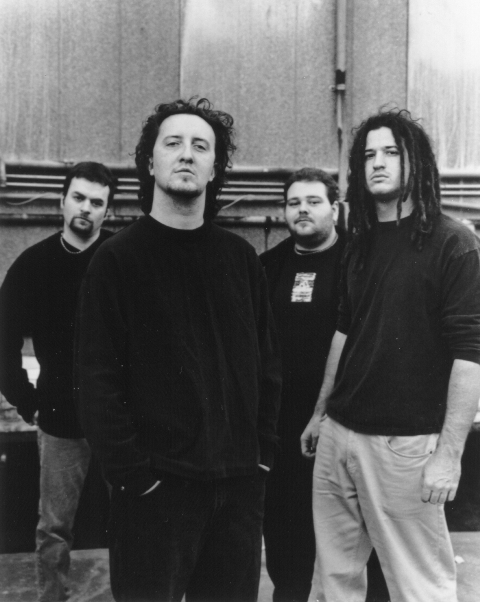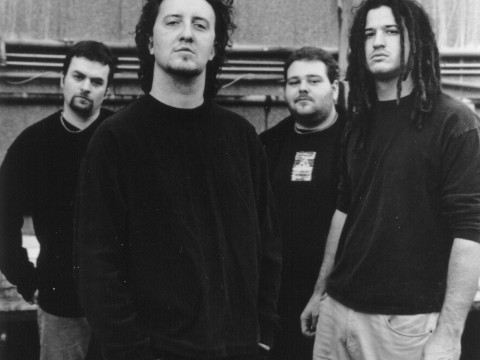By Jeff Maisey
The year was 1995. Hard-edged rock groups such as Helmet and Biohazard were all the rage. In Hampton Roads, Mindset was right on-par with these bands.
Mindset released a self-titled album and a follow-up titled A Bullet for Cinderella. Both were on German-based indie label Noise Records. The band experienced a shift in members, with Don Campbell playing guitar on the first record and John Smallwood replacing him on the second. They disbanded in 2000.
When the band reunites for its 20th anniversary on June 13 at Pancho & Luigi’s in Norfolk, Campbell and Smallwood will perform onstage together for what is sure to be a serious wall of power sound.
I recently caught up with singer Roddy Lane to learn more about their upcoming gig.
What’s behind this anniversary show?
It was accidental regarding the timing. It just so happened that our drummer Kenny, who lives down in Florida, gave me a shout and said, “Hey, see if you can book a gig for the Mindset reunion.” He suggested seeing if Johnny wanted to do it. I grabbed the baton from there. Then we wanted to get both guitar players involved. And everybody is totally down for it. We’re going to perform for the first time as a 5-piece. We’re going to cover as many of the songs as we can from both albums.
Take us back 20 years: How did Mindset form and describe the local metal scene at that time?
The timing was right. I was playing in a band when Don, Kenny and John O’Neil were working on a project and were looking for a singer. They cornered me and bought me drinks. They buttered me up to what was going to become Mindset.
The music scene was definitely different back in those days. There were a lot of bands. Music came from a more honest, agro approach. There were a lot of clubs. People supported one another as far as bands go. It was more of an inspiring time. Back in ’95 we had to actually make phone calls and talk to one another and communicate. Now you text someone in the next bedroom to find out what’s for dinner. Everything is so lazy now. We had to make fliers and go to clubs and comic book shops and put fliers up.
What can you tell us about the recording of your debut album?
For both albums we recorded them with the same production team. We recorded at Oz Studios in Baltimore. For two weeks we lived in the studio. It was surreal. When we started Mindset we had no idea that these things were going to happen, like going over to Europe and touring most of the country.
What I liked about Mindset was that you were more melodic that most metal bands of the mid-90s. Was that important in making Mindset stand out?
I like to think it did. The first album was definitely a little more Neanderthal. With the second album we learned to walk upright. I’m proud of both albums. Noise Records just didn’t know what to do with us. We were a band that had a lot of melodic sense. We weren’t just thrashing it out. They had enough trouble trying to market the first album, but when A Bullet for Cinderella came out it’s almost like they gave up.
The label had distribution in America and Europe. What was your European experience like as a band?
There was a metal magazine called Metal Hammer. They were sponsoring a big show in London. We flew over. We played the show in London and then we did a press junket where we went to Stockholm, Paris and Amsterdam and did a shit-load of interviews.
When we got signed it was the best of times and the worst, not to sound like a cliché. Everybody in the band gave up their homes and their jobs to go out on the road to try to be rock stars. We thought once we got signed all our trouble would be over. But shit just got heavy.
What led to the breakup of Mindset in 2000?
We had beat the horse beyond recognition. After the second album came out in 1999 we parted ways with Noise. We tried to keep it going. Out of our own pockets, we were out on the road for three to five days and then come home for two of three before going back out. We just kept doing that non-stop. We tried to build up more name recognition. We tried to get another record deal. Kid Rock took a shine to us so we recorded some demos for Atlantic Records, which went absolutely nowhere. After countless disputes with record company people coming up to us telling us we don’t have enough tattoos or this guy needs to lose weight. We were, like, “fuck you.” It was time to just call it. At that point we could see that it wasn’t really about the music anymore. We can still write kick-ass music. I don’t have any kind words to say about industry people.
Mindset
w/Deist Requiem, Remnants of Honor
June 13
Pancho &Luigi’s





